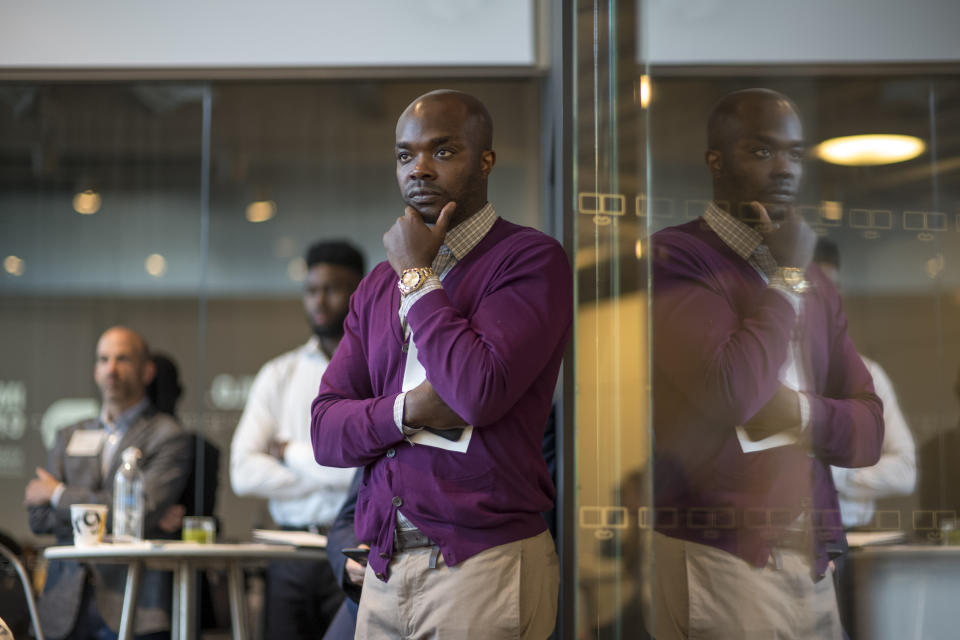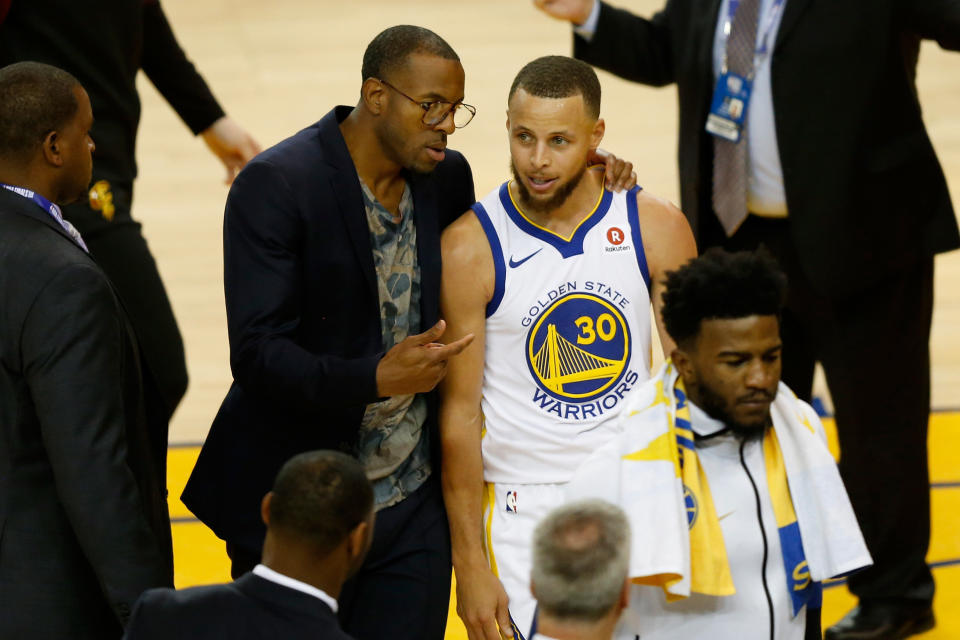The new rules of athlete tech investing, according to Rudy Cline-Thomas
Together, venture capitalist Rudy Cline-Thomas and Golden State Warriors player Andre Iguodala have taken equity stakes in a range of buzzy, consumer-facing startups: Casper (mattresses); Lime (e-scooters); NerdWallet (personal finance app and website); The Players’ Tribune (Derek Jeter’s content site); and Walker & Co., the beauty brand that makes Bevel razors and sold to Procter & Gamble last year.
But it’s the less sexy businesses that interest Cline-Thomas most these days – the names that don’t instantly register with most Americans.
For example, he and Iguodala are invested in Zoom, the teleconferencing service that anyone who works in a big office has used, but barely notices; he also cites Carta, formerly called eShares, which makes valuation software for tracking tech investments. “The enterprise companies are the investments we really really love,” Cline-Thomas said on this week’s episode of the Yahoo Finance Sportsbook podcast. “The ones that you don’t hear about.”
The inverse is true as well: if everyone is talking about something, he stays away from it. “If my Uber driver is asking me about crypto, it’s probably something I should not be investing in.”
Cline-Thomas is the founder of VC firm Mastry Inc. (The name is a homage to the painter Kerry James Marshall.) He began his career as a sports agent, but didn’t enjoy it; then he pivoted to being a financial adviser to athletes. Today, he is Iguodala’s off-the-court investment guru (Iguodala calls him “my consigliere”) and also advises a range of other pro athletes, mostly NBA players.
He has become so closely connected to the Golden State Warriors that he found himself front-and-center on the cover of Bloomberg Businessweek in 2017 with Iguodala and Steph Curry. In 2017, the three of them co-created the Players Technology Summit.
Cline-Thomas has eyed tech since 2009, when he began attending TechCrunch Disrupt simply as an enthusiast. “I just bought a plane ticket and sat in the crowd with everybody else,” he says. “I wanted to learn, and had to figure out how I was going to get in.” Through networking, he met Josh Kopelman, founder of the VC firm First Round Capital in Philadelphia. Kopelman “taught me the business,” Cline-Thomas says. “And he’s not a bad guy to learn it from.”
Learning, and self-education, is Cline-Thomas’s main mantra he preaches to pro athletes looking to invest in startups, tech or otherwise. Too many of them, he says, want to jump in too quickly and throw money at a brand they know. Investing takes listening, and homework. “I had a bunch of athletes as clients, Andre just listened the most,” he says. “It’s understanding that it’s not just the celebrity status of having people approach you, there’s work to be done in educating yourself and understanding how this all works. It’s not sexy.”

There’s another glaring caveat Cline-Thomas gives to athletes: venture investing is extremely high-risk. “I always say, make a venture investment with money you’re not afraid to lose. Most people do not make money investing in tech, especially from the venture side of things,” Cline-Thomas says. “The biggest proponent that I want to be is telling them not to do it.” It is not what you typically imagine wealth advisors telling athlete clients: hold onto your money.
Rushing into investing in a business is why so many pro athletes end up filing for bankruptcy only a few years after retiring from their sport. And indeed, Cline-Thomas warns, “The next [financial] casualties that we hear about in reference to athletes, I think are going to come from tech.”
That scenario is all too easy to envision when you look at how rapidly the NBA’s biggest stars have become tech investors. And very rarely do you see any of these stars in TV ads for the startups. Instead, they invest behind the scenes, building relationships with founders and getting progress updates like any other full-time backer would expect.
Carmelo Anthony launched a tech investing fund in 2014. Kobe Bryant launched a tech and media investing fund in 2016. Derek Jeter focused on media and publishing investments immediately after retiring, before he bought the Miami Marlins; LeBron James has gone Hollywood by producing and starring in an eye-popping lineup of scripted and documentary shows; Kevin Durant recently debuted a new sports business series that streams on ESPN+; Iguodala’s teammate Curry has bought into Pinterest, the coaching platform CoachUp, and recently SnapTravel.

Many of their NBA peers want to get in on the same action, and are dazzled by the glitz of Silicon Valley. And Cline-Thomas says bluntly, “Let’s call a spade or spade, too: they’re also reading about the money that’s being made.”
Iguodala and Cline-Thomas saw the hunger around the NBA for investing education when they first held a casual event in San Francisco years ago and invited a small handful of tech CEOs, VCs, and Warriors players. “We saw how powerful that was,” Cline-Thomas says. “A lot of the guys had never had that access before, and been in the room before.”
Cline-Thomas and Iguodala have now opened the door to younger NBA players looking to get in on the investing rush. They brought Kristaps Porzingis in on their investment in sneaker site GOAT, and Cline-Thomas is also advising Dallas Mavericks player Harrison Barnes and Brooklyn Nets player Rondae Hollis-Jefferson, among others.
As the interest among pro athletes to put their money into new companies reaches a fever pitch, consiglieres like Cline-Thomas are becoming more crucial. His weekly newsletter reaches a range of NBA, NFL, and MLS players. And they all want to learn.
Listen to Rudy Cline-Thomas on this week’s Yahoo Finance Sportsbook podcast:
—
Daniel Roberts is the sports business writer at Yahoo Finance. Follow him on Twitter at @readDanwrite.
Read more:
Draymond Green: Why I bought 20 Blink Fitness gyms
Lacrosse star Paul Rabil launching new lax league with Wall Street money
NFL veteran Martellus Bennett: ‘I’m trying to build a Disney’
Dale Earnhardt Jr.: Every athlete wants to ‘find their Foreman Grill’
Rob Gronkowski explains his approach to endorsements
David Ortiz: ‘It’s so easy to blow money’
Mariano Rivera’s advice for athletes: ‘That money will never come back’

